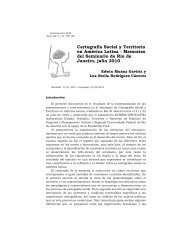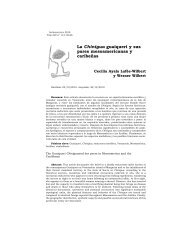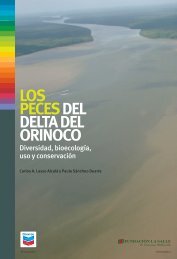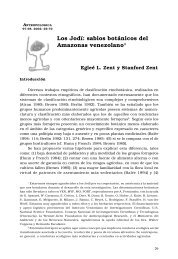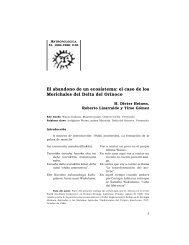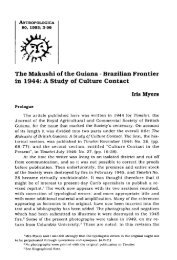War and a Semblance of Peace in the Inca Heartland
War and a Semblance of Peace in the Inca Heartland
War and a Semblance of Peace in the Inca Heartland
Create successful ePaper yourself
Turn your PDF publications into a flip-book with our unique Google optimized e-Paper software.
The Informaciones: Witnesses from <strong>the</strong> Region between Jauja <strong>and</strong><br />
Cuzco<br />
Before beg<strong>in</strong>n<strong>in</strong>g, <strong>the</strong>re is one caveat: <strong>the</strong> questions <strong>and</strong> answers <strong>of</strong> <strong>the</strong><br />
Informaciones rely on terms drawn from a Spanish vocabulary, so some<br />
discussion <strong>of</strong> Spanish forms <strong>of</strong> political organization is necessary. At <strong>the</strong> time<br />
<strong>of</strong> <strong>the</strong>se <strong>in</strong>terviews, <strong>the</strong>re were compet<strong>in</strong>g forms <strong>of</strong> political organization <strong>in</strong> <strong>the</strong><br />
Spanish conceptual repertory: one, <strong>the</strong> señorío, or hereditary lordship,<br />
<strong>in</strong>volved both a tribute right over a territory <strong>and</strong> civil <strong>and</strong> crim<strong>in</strong>al<br />
jurisdiction; ano<strong>the</strong>r, behetría or comunidades, was <strong>the</strong> free community, still<br />
subject to royal authority but under a local lord <strong>of</strong> its choice (Glick 1979, chp.<br />
4). The señorío had been ga<strong>in</strong><strong>in</strong>g ground s<strong>in</strong>ce <strong>the</strong> eleventh century, but it was<br />
to make a real surge <strong>in</strong> growth <strong>in</strong> <strong>the</strong> sixteenth <strong>and</strong> seventeenth centuries. It<br />
is clear from Toledo’s attitude toward <strong>the</strong> behetría, that he thought it to be an<br />
<strong>in</strong>ferior form <strong>of</strong> organization. The third question <strong>of</strong> <strong>the</strong> first questionnaire<br />
asked specifically if towns were governed “<strong>in</strong> <strong>the</strong> manner <strong>of</strong> behetría or<br />
comunidades” (f. 14v). Clearly, <strong>the</strong> viceroy’s purposes were served when <strong>the</strong><br />
witnesses said that <strong>the</strong>re had been no hereditary lords before <strong>the</strong> <strong>Inca</strong>s.<br />
The very first <strong>in</strong>terviews <strong>in</strong> Jauja brought <strong>the</strong>se issues to <strong>the</strong> fore. Four <strong>of</strong><br />
those <strong>in</strong>terviewed were caciques (<strong>the</strong> Caribbean term used everywhere <strong>in</strong> <strong>the</strong><br />
Americas to describe local headmen) <strong>of</strong> <strong>the</strong> subdivision <strong>of</strong> Hur<strong>in</strong>guancas, one<br />
<strong>of</strong> three subdivisions <strong>of</strong> <strong>the</strong> Jauja prov<strong>in</strong>ce. One <strong>of</strong> <strong>the</strong> witnesses, Felipe Poma<br />
Macao, had been a curaca (<strong>the</strong> local term for a hereditary prov<strong>in</strong>cial <strong>of</strong>ficial <strong>in</strong><br />
<strong>Inca</strong> adm<strong>in</strong>istration, which was <strong>of</strong>ten used synonymously with cacique, see<br />
Julien 1982: 122-126). Specifically, he had been head <strong>of</strong> a pachaca (an<br />
adm<strong>in</strong>istrative unit <strong>of</strong> 100 households). He testified that, before <strong>the</strong> time <strong>of</strong><br />
<strong>the</strong> empire, <strong>the</strong>re had been c<strong>in</strong>checona, or capta<strong>in</strong>s <strong>in</strong> time <strong>of</strong> war. They had<br />
not been hereditary, but were chosen on <strong>the</strong> basis <strong>of</strong> <strong>the</strong>ir abilities, as<br />
observed <strong>in</strong> combat situations (f. 28v). His testimony was seconded by o<strong>the</strong>r<br />
Hur<strong>in</strong>guanca witnesses. The name c<strong>in</strong>checona was translated by more than<br />
one Hur<strong>in</strong>guanca witness as “now this one is valiant” (agora es este valiente, f.<br />
17). Ano<strong>the</strong>r witness, Hern<strong>and</strong>o Apach<strong>in</strong>, a curaca as well, noted that each<br />
town (pueblo) 3 governed itself “<strong>in</strong> <strong>the</strong> manner <strong>of</strong> communities” (a manera de<br />
comunidad, f. 32), <strong>and</strong> here <strong>the</strong> <strong>in</strong>terpreter is supply<strong>in</strong>g a comparison to<br />
Spanish forms. Ano<strong>the</strong>r witness, Alonso Cama, testified that c<strong>in</strong>checona were<br />
chosen when <strong>the</strong> town had to defend itself. Someone who might become<br />
c<strong>in</strong>checona was <strong>the</strong> sort <strong>of</strong> person who would <strong>in</strong>spire <strong>the</strong> people to fight <strong>and</strong><br />
3 A pueblo was more than just <strong>the</strong> name <strong>of</strong> a settlement. It was <strong>the</strong> lowest rung <strong>in</strong> a hierarchy<br />
<strong>of</strong> three urban forms <strong>in</strong> <strong>the</strong> Americas: city (ciudad), villa (villa) <strong>and</strong> town (pueblo). In Spa<strong>in</strong>, <strong>the</strong><br />
term lugar was used <strong>in</strong>stead <strong>of</strong> pueblo to refer to <strong>the</strong> same form. All <strong>of</strong> <strong>the</strong>se urban forms had a<br />
rural territory associated with <strong>the</strong>m, though <strong>in</strong> <strong>the</strong> case <strong>of</strong> villas <strong>and</strong> pueblos, this was not<br />
extensive. There is ano<strong>the</strong>r use <strong>of</strong> <strong>the</strong> word pueblo that we should consider: it also referred<br />
generally to “a people”. I th<strong>in</strong>k <strong>the</strong> Jauja witnesses are us<strong>in</strong>g <strong>the</strong> term to refer to a small, local<br />
jurisdiction.<br />
191



